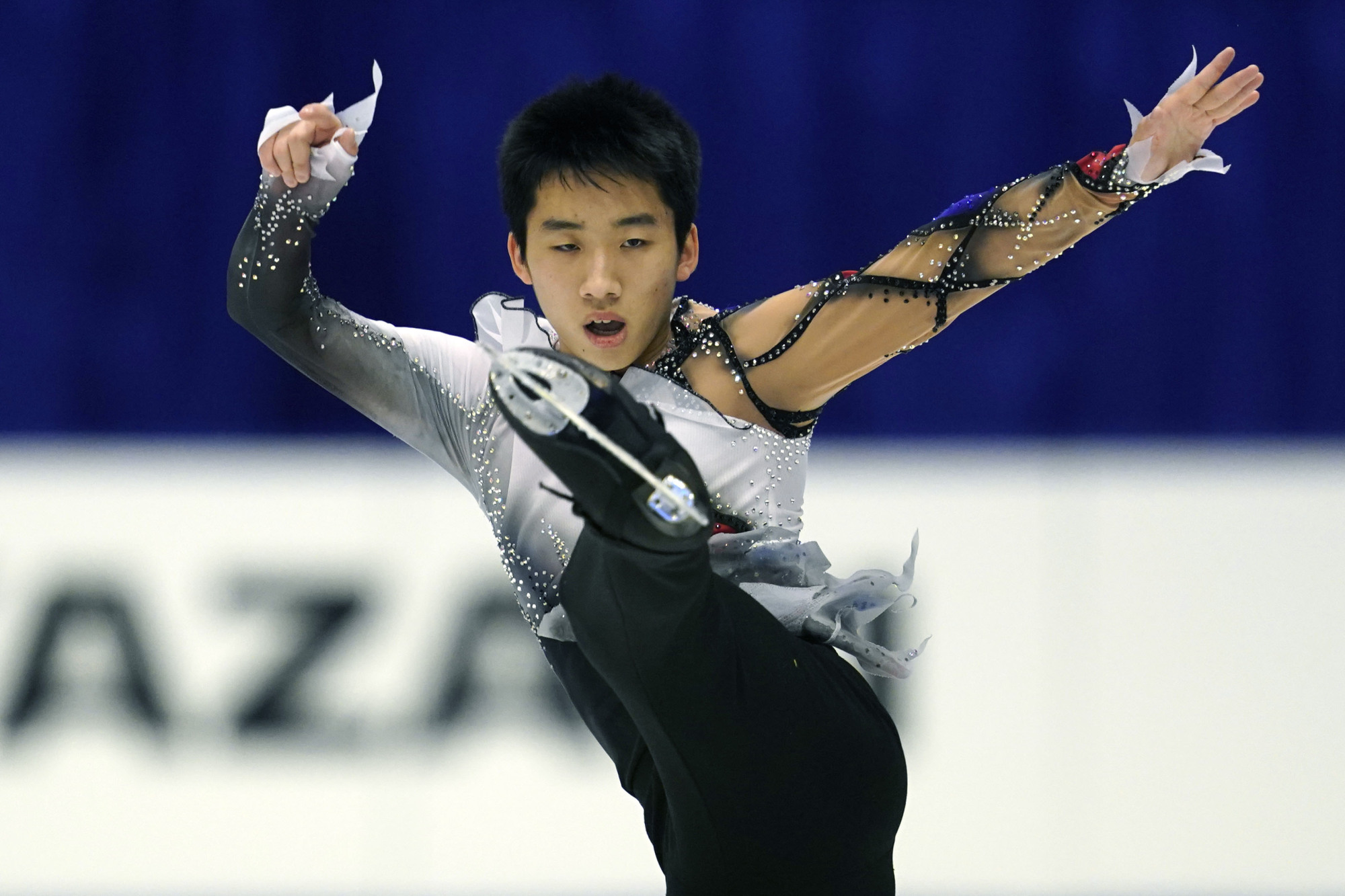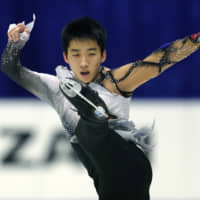Tomoki Hiwatashi made his competitive debut in Japan at the NHK Trophy last month before an appreciative crowd. Though he finished a disappointing 10th, fans had a chance to see the young American's potential firsthand.
Hiwatashi's story is unique. Born in the United States to Japanese parents from Kobe, he has never lived in Japan, yet speaks the language fluently (with a Kansai dialect), while competing for the U.S.
In an exclusive interview with Ice Time, the 19-year-old talked about the apparent contradiction of his life, discussed his skating and plans for the future.
"I have heard of people like me who get frustrated or confused. Like, am I Japanese? Am I American? Especially people who are half," Hiwatashi stated. "I consider myself American, because I am Team USA's athlete. I have been skating in America for a long time.
"Also, I have the Japanese blood. My parents are Japanese," Hiwatashi commented. "I really can't consider myself American, nor can I consider myself Japanese. I'm not both, I'm not half of each either. I feel like I have the good part of both sides and best part of both sides."
Hiwatashi was born in Englewood, New Jersey (the same hometown as the legendary Dick Button), but grew up in the Chicago area after his family relocated there a few years later. His father Satoshi is in the import-export business.
Taking to the rink for the first time at the age of 5, Hiwatashi was hooked and in the succeeding 14 years has won every U.S. title but the senior one currently held by world champion Nathan Chen.
Hiwatashi, who owns both U.S. and Japanese passports, won the world junior title last season, and his desire, like most elite skaters, is to make it to the Olympics.
"The goal is to be on the U.S. Olympic team for 2022. I have to keep my goals high," Hiwatashi declared. "For this year, I hope to make it to worlds."
After placing fifth at both the Internationaux de France and the U.S. International Classic this season, his hopes were high going into the NHK Trophy.
However, Hiwatashi struggled in both his short program and free skate in Sapporo.
"I did feel some pressure skating in Japan for the first time," Hiwatashi said, "but I need to continue to grow as a skater."
The 160-cm Hiwatashi specified the areas where he needs improvement for Ice Time.
"Artistry and jumps, they are both very important aspects of skating," Hiwatashi noted. "With the jumps I need more quads, they are a very big part of skating now. I really need to work on jumps. It's the same for artistry.
"There is nothing I can do against Jason Brown, or Yuzuru (Hanyu) or Shoma (Uno). How they skate and what they do is so amazing. I compete with them, but it's more like I skate in the same competition, but I'm really not competing with them."
Hiwatashi expanded upon that statement.
"I'm on the same ice with them, but really not on the same level," Hiwatashi stated. "I feel like that is where I need to push for and go for. That's where I need to get up to — where Nathan is, where Yuzuru is, where Shoma is, where all of those skaters are."
Though he doesn't consider himself an equal to Hanyu or Uno, Hiwatashi does share something in common with them — costume designer Satomi Ito. She made his outfit for his short program to "Love Runs Out" this season.
Hiwatashi, who was homeschooled, is currently enrolled at Pikes Peak Community College in Colorado Springs, Colorado, where he's studying business.
"I really took business because I thought it can help me in the future with whatever I want to be," Hiwatashi commented. "I don't really have any idea what I want to be. I will eventually transfer to a four-year school."
Speaking about business, Hiwatashi acknowledged the financial burden that skating places on families.
"Skating is so expensive. My father makes enough to keep me skating, but that is still not enough sometimes," Hiwatashi noted.
Hiwatashi's father lives and works in the Chicago area, while he and his mother Satomi reside in Colorado.
Hiwatashi, who does not have an agent, says his mother handles his finances.
"My dad likes to watch my skating, but does not want to get too involved," Hiwatashi commented.
Unique approach to skating
Hiwatashi, who, unlike most skaters, jumps and spins clockwise, moved to Colorado three years ago to train under Christy Krall and Damon Allen and believes it has worked out well for him.
"I feel like Colorado is a great place to train," Hiwatashi remarked. "With the OTC (Olympic Training Center) there and the Broadmoor Arena, there is a lot of support. I have never had that much support before."
Something else Hiwatashi does that is unusual is how he cracks his own neck right before skating his programs.
Ice Time wondered about this and asked him the reason behind it.
"It's really just superstition. I feel like I started it last year," Hiwatashi stated. "It kind of releases the energy when I do that. It makes my neck feel loose and relaxed.
"I feel like when I'm relaxed it is easier to skate through the program."
Though retirement is a long way off for him, Hiwatashi, who will turn 20 next month, already has an idea of what he wants to do when he hangs up his competitive skates.
"I would love to stay involved after retiring. I don't think I would be involved in skating as a coach or judge or technical specialist," Hiwatashi said.
"I would like to be a pro skater. If I had a chance, I would like to do what Ben Agosto and Charlie White are doing as TV analysts. I think that would be really fun and a good experience."
Hiwatashi told Ice Time he definitely does not envision coaching in his future.
"I have done some coaching with young kids and that was good. But it is hard to relate how I do things," Hiwatashi stated. "Walking on the ice is so natural, that I don't think about it. When someone asks me to teach that, it's difficult. It is the same with jumps. It's not easy to describe things in words with what you do with your body."
Hiwatashi believes that people who came to skating later while growing up make good mentors.
"I think those who did not start skating until they were 8 or 9 might make better coaches," Hiwatashi declared. "I feel like good coaches are people who were able to think and learn as they went through the process, whereas it was more natural for me."
Hiwatashi was invited to skate in a show in his ancestral homeland for the first time last summer.
"I came here after junior worlds to spend time with my family," Hiwatashi recalled. "Shortly after that I got the call to be in 'The Ice' and I was really excited."
Hiwatashi performed in Osaka, Nagoya and Niigata with the show.
"We had a good group of people," Hiwatashi said. "Nathan, Shoma, (Jin) Boyang, Misha Ge for the men. The women skaters were Kaori (Sakamoto), Rika (Kihira), Miyu and Marin (Honda) and Alina (Zagitova)."
Hiwatashi would welcome the chance to skate in more shows here.
"I would love to skate in some more shows in Japan," Hiwatashi revealed. "If they ask me to, I would love to. I hope I am building up a fanbase in Japan."
Hiwatashi says the financial incentive that comes with being a successful elite skater is not what motivates him.
"To me skating is not about money," Hiwatashi declared. "My skating career, I don't know how long it will last. I will have a second life and career.
"Being able to skate in front of the audience and being able to have the fans know me, that is what's really important for my skating. It's all about what the audience considers good."
Junior Grand Prix Final field
The lineup for this week's JGP Final in Turin, Italy, will feature Japan junior champion Yuma Kagiyama and runner-up Shun Sato. The duo will vie for the title with Russia's Andrei Mozalev, Petr Gummenik and Daniil Samsonov and Italy's Daniel Grassl.
There are no Japanese women in the JGP Final this year.
Russia will have four women in the competition (Kamila Valieva, Kseniia Sinitsyna, Daria Usacheva, Viktoria Vasilieva) that will also include U.S. senior champion Alysa Liu and South Korea's Lee Hae-in.



















With your current subscription plan you can comment on stories. However, before writing your first comment, please create a display name in the Profile section of your subscriber account page.